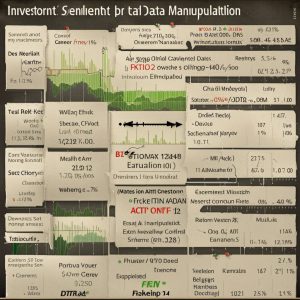
Stock Market 101
No profession requires more hard work, intelligence, patience and mental discipline than successful speculation…Robert Rhea (The Dow Theory)
Accepting the reality of losses is an essential aspect of successful trading. New traders often fall for the trap of believing that they can win every trade, but experienced traders know that this is not possible. Trading always involves risks and rewards, and losses are an inevitable part of the game. Ignoring or denying losses can lead to financial ruin, as traders who refuse to accept losses are more likely to make poor decisions and take excessive risks.
Traders must be willing to accept losses and learn from them. Losses can provide valuable insights into what went wrong and how to improve strategies for future trades. Successful traders understand that losses are a natural part of the trading process and do not allow them to affect their emotions or cloud their judgment.
It is essential for traders to have a realistic mindset when it comes to trading. There are no shortcuts to success in the markets, and there is no magic formula that guarantees profits. Instead, traders must be prepared to put in the hard work and make smart decisions based on careful analysis and research.
Overall, traders must accept the reality of losses and be willing to learn from them. By doing so, they can develop a successful trading strategy that takes into account both risks and rewards. It may not always be easy, but accepting losses is a critical component of becoming a successful trader.
These e articles provide more information and validation of the importance of accepting losses in trading:
- “Why Losing Trades are Good for You” by Dr Alexander Elder (https://www.moneyshow.com/articles/daytraders-13029/why-losing-trades-are-good-for-you/)
- “Why Accepting Losses is the Key to Trading Success” by TradingSim (https://tradingsim.com/blog/accepting-losses/)
- “The Importance of Embracing Losses” by Investopedia (https://www.investopedia.com/articles/trading/08/embracing-losses.asp)
Stock Market 101: Psychological Aspects of Trading
There are two significant psychological aspects of the risk/reward concept. Although they may appear to be similar, they are not. The first aspect involves doing things correctly. This means making a trading plan and following it with extreme discipline. As easy as this seems, traders struggle the most because it involves keeping a trading journal, writing down every trade, and an honest inventory of all actions taken during the trading day. Sadly, some do not do this and have no record of what they did or why. This is similar to a businessman who does not keep up the books for his business. How long do you think such a business will survive?
The second aspect of the risk/reward concept is avoiding mistakes. We are all human and make mistakes, but there is a benefit to this. That benefit is obtained by studying the mistakes thoroughly (via the trading plan and journal) and then doing everything possible not to repeat them again. This is how we grow and develop — both as traders and in life.
We learn through our mistakes–more so than by doing things correctly. We accumulate regret through making mistakes and accepting them with rigorous honesty. This regret is a form of personal responsibility that then drives us to make a firm commitment to never repeat that mistake.
Stock Market 101 Point 3: Discipline and Self Responsibility
Self-discipline and personal responsibility are two practical principles that help us anticipate and even avoid making mistakes. Personal responsibility plays a significant role in trading success. This is because the trader is entirely responsible for his or her own market choices. It is the trader who decides to enter or leave a trade, and the trader must accept this decision. If he doesn’t, it is like jumping out of an aeroplane with a busted parachute, hoping it will start working before he hits the ground.
It is like a poor swimmer heading into treacherous waters because she assumes the lifeguard on the beach will save her if things get out of control. In the markets, you are your parachute and your lifeguard. No one is going to save you but you! The power of personal responsibility in trading cannot be taken lightly and should be a bedrock belief for everyone who enters the markets.
Self-reflection
As yourself, these simple questions:
- Has anything changed from my original plan?
- Has the technical pattern or company profile changed from the time I entered the trade?
- Has my initial price objective changed?
- Has my stop been hit?
These four questions should be written at the top of every page in your trading journal because they remind you that you are responsible for every aspect of your trade. If the answer to any of these questions is “yes,” then you must exit the trade. If the answer to any of these questions is no, you must manage the trade.
As you can see, personal responsibility is the foundation for self-discipline. Thinking about losing or winning requires discipline. By focusing daily on your trading journal and the four questions above, you become disciplined. Examining your daily trading journal is the best way to spot mistakes and analyze where you have acted impulsively, impatiently or allowed your rat brain to take over. Taking personal responsibility for any errors and then being disciplined to avoid making them again is among the quickest ways to achieve lasting trading success.
Good luck happens when preparation meets opportunity; bad luck happens when lack of preparation meets a challenge…Paul Krugman (Economist, NYT Op-Ed March 3, 2006).
Biography
Janice Dorn, M.D., PhD, received a PhD in Anatomy (Neuroanatomy) from the Albert Einstein College of Medicine in New York. She is certified by the American Board of Psychiatry and Neurology and the American Board of Addiction Medicine. Dr Janice Dorn has written over 1,000 articles on trading psychology and behavioural finance. Dr Dorn is dedicated to providing education and training about how the brain, psychology and emotions impact financial decision-making. Janice advocates for the elderly, a lifelong dancer and a pianist. Her website is mindmoneymarkets.com.
Research
- The Importance of Emotions in Investing: https://www.investopedia.com/articles/investing/021716/importance-emotions-investing.asp
- Mass Psychology and the Stock Market: https://www.investopedia.com/articles/active-trading/052014/mass-psychology-and-stock-market.asp
- Why Trying to Time the Market Is a Fool’s Errand: https://www.fool.com/investing/2018/05/10/why-trying-to-time-the-market-is-a-fools-errand.aspx
Other articles of interest:

Becoming a Better Investor: Key Strategic Moves

Investing in a Bear Market: Ignore the Naysayers

Buy the Dip: Dive into Wealth with this Thrilling Strategy

Resource Wars: Navigating a Shifting Global Landscape

The Prudent Investor: Prioritizing Trends Over Speculation

Optimal Strategies for The Best Stocks To Invest Long Term

Seizing Dominance: The Relentless Rise of Mental Warfare

What is Inflation? Unveiling Effects and Strategies for Mastery

The Cycle of Manipulation in Investments

Investor Sentiment Data Manipulation: Unveiling Intriguing Insights

Stock Buybacks: Exploring Their Detrimental Effects

US Dollar Rally: Is it Ready to Rumble?

Stock Books For Beginners: Investing Beyond the Pages

Psychological Manipulation Techniques: Directed Perception

False Information and Its Consequences


